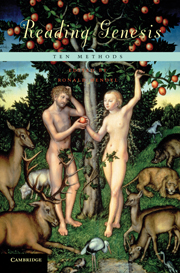Book contents
- Frontmatter
- Contents
- Contributors
- Acknowledgments
- Reading Genesis
- Introduction
- 1 Literature
- 2 Cultural Memory
- 3 Sources and Redaction
- 4 Gender and Sexuality
- 5 Inner-Biblical Interpretation
- 6 Rabbinic Interpretation
- 7 Interpretation in the Early Church
- 8 Translation
- 9 Modern Literature
- 10 Modern Theology
- Index of Biblical Citations
- General Index
- References
3 - Sources and Redaction
Published online by Cambridge University Press: 05 June 2012
- Frontmatter
- Contents
- Contributors
- Acknowledgments
- Reading Genesis
- Introduction
- 1 Literature
- 2 Cultural Memory
- 3 Sources and Redaction
- 4 Gender and Sexuality
- 5 Inner-Biblical Interpretation
- 6 Rabbinic Interpretation
- 7 Interpretation in the Early Church
- 8 Translation
- 9 Modern Literature
- 10 Modern Theology
- Index of Biblical Citations
- General Index
- References
Summary
Philology
The modern discipline of biblical studies was born when the Bible became the object of modern (as opposed to traditional) knowledge – that is, knowledge governed by the ideal of formalized science. True, certain premodern commentators had already expressed doubts about various traditional claims regarding the Bible's authorship. How likely is it, for example, that Moses – the author of the Torah (“the Five Books of Moses”) according to venerable tradition – wrote the account of his own death in Deuteronomy 34:1–8? But it was only after the advent of Renaissance Humanism in the fourteenth and fifteenth centuries – the period that witnessed the rediscovery of classical Greek and Latin texts and the invention of the printing press – that the Bible, along with other ancient texts, began to be subjected to systematic scrutiny. Criticism, as the modern analysis of texts came to be called, attempted not only to establish critical editions of the Bible and other ancient works out of the welter of available manuscripts (lower or textual criticism) but also to determine those works’ provenance on the basis of various linguistic and literary criteria (higher criticism).
Common to both tasks is the desire for what Jean-Claude Milner refers to as “precision” – a symptom, Roland Barthes would have added, exhibited by those who “love,” are “obsessed by,” the text. Not coincidentally, criticism also came to be known as philology. Such were its accomplishments that Galileo himself, Milner reminds us, took it as his ideal: “In the eyes of Galileo, mathematics and measure were the means – some of the means, it will subsequently be revealed – that would permit humble physics to one day equal what prestigious philology, through the science of language (through grammar) and through the science of written documents, had long ago accomplished.” This “love of words” would eventually beget the first “exact science” of language – viz., comparative philology or historical linguistics – as well as the modern discipline of literary studies.
- Type
- Chapter
- Information
- Reading GenesisTen Methods, pp. 47 - 70Publisher: Cambridge University PressPrint publication year: 2010
References
- 1
- Cited by

